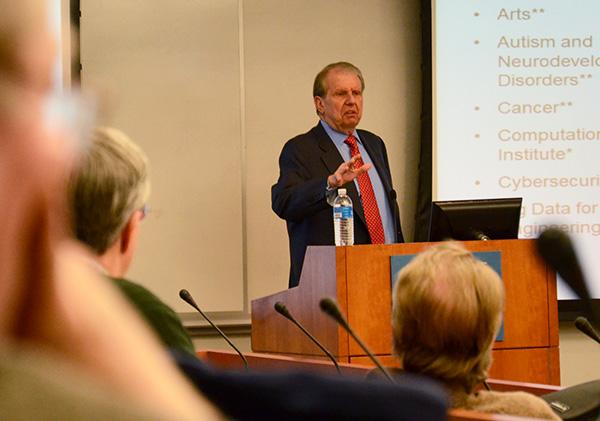Updated: Jan. 26, 2015 at 3:19 p.m.
Faculty leaders say turnover of research project support staff is hurting GW’s chance of securing high-profile grants.
At least three faculty leaders say they are concerned that the department has been unable to maintain a constant staff, which has created a difficult transition for researchers. Faculty say turnover among the grant officers and project administrators – lower-level employees who work with researchers every day – is preventing the University from producing top-level research projects.
At January’s Faculty Senate meeting, Marie Price, a professor of geography and international affairs, expressed concerns about her department’s interactions with the research office. She said she has had “frustrating experiences” trying to find staff members with whom she previously worked.
“There does seem to be a very serious issue of turnover and not enough staff in your office to deal with these complex grants,” she said.
The Office of the Vice President for Research declined to provide the number of staff members who have joined or left the office during the past five years. Vice President for Research Leo Chalupa said he wasn’t aware of those problems in the office.
The office has already restructured itself, placing more resources for faculty within each of GW’s 10 schools. Expenditures for research also increased by 11 percent last year.
Jennifer Wisdom, associate vice president for research, said pilot programs in the Columbian College of Arts and Sciences, the School of Engineering and Applied Science and the Graduate School of Education and Human Development have placed seven new research administrators among those three schools.
“I am hopeful that as the University continues to increase its external funding we can all collaborate on the best ways to help our faculty,” she said.
Donald Parsons, a professor of economics, said at the meeting that the administrative side of research at GW has had setbacks since he came to campus 20 years ago. He recommended that administrators take time to reevaluate the office before pursuing larger grants or projects it may not be prepared to handle.
Anthony Yezer, a professor of economics who served as chair of the Faculty Senate’s research committee for several years before stepping down last year, said because the University is surrounded by top federal agencies, grant officers are likely to receive better offers at other institutions and leave.
He said universities in other locations don’t face as high rates of turnover because, compared to schools in D.C., they don’t have staff trained to deal with grants and contracts receiving as many offers.
“We’re in a high wage area,” he said. “On the other hand, if you pay very high wages, then you’re not going to make any money.”
He said his committee passed resolutions to implement software in the research office that would help track grants and help new staff members transition into working with faculty, but the programs have not been placed in the office.
Ramin Sedehi, a former vice dean at the University of Pennsylvania’s School of Arts and Sciences, said contract officers will sometimes leave research offices for other opportunities because they don’t have a chance to move up any further at the institution.
“There’s a set of skills that they learn and they’re able to apply it at the next higher level, so I think being able to move onto a higher-level position or something very similar is in the normal trajectory of these folks,” he said.
Sedehi said GW’s location places it close to top research institutions like the National Institutes of Health and the National Science Foundation, meaning it’s easier for research staff members to leave their positions for another organization that might offer more incentives.
He added that changes in an office structure combined with a push to succeed during a time when grants are more difficult to earn than ever can put pressure on research staff members.
Health science administrators, NIH’s equivalent of grant officers, are required to hold a Ph.D. or have an equivalent level of education and can earn up to $158,700 annually. NSF program directors help determine grant funding and have a top salary of $167,000 a year.
One professor, who spoke on the condition of anonymity, said research staff had no opportunity to improve their status beyond their original position, limiting their motivation to continue at the University.
“Many times I joke with people here that they’re too efficient and good,” he said. “I walk into their office and say the clock is ticking until they leave.”







